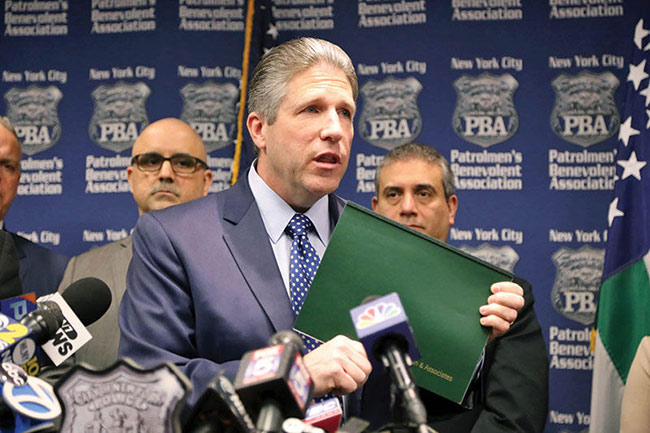




 PATRICK J. LYNCH: Displeased by City's offer
PATRICK J. LYNCH: Displeased by City's offer
The Patrolmen’s Benevolent Association appears bound for contract arbitration after the de Blasio administration Oct. 18 presented a wage proposal of just 4.25 percent in raises over a 42-month period and asked the union to fund it by forsaking key benefits including its annuity fund and the right of future members to a Variable Supplements Fund, while also providing its share of $2.4 billion in health-care givebacks that will be sought from all the municipal unions.
‘42 Months of Net-Zero’
PBA President Patrick J. Lynch, in a letter to union members that was obtained by this newspaper, wrote that “the city’s own negotiators confirmed that their intention is to provide PBA members with 42 months of net-zero raises, and that any wage increases must be 100% paid for through a list of givebacks.”
According to the letter, the city also demanded that the PBA withdraw several grievances and improper-practice litigation, and proposed a pilot program featuring 10-hour tours for specialized units, “which the Office of Management and Budget suggests may result in an additional cost that would need to be funded by PBA members.”
City Labor Commissioner Robert W. Linn in an Oct. 20 phone interview defended the city’s demands, saying, “It is a reasonable proposal, in the context of the union still asking for 29-percent raises over two years.”
The letter signaled another rocky turn in what has often been a fractious relationship between Mr. Lynch and Mayor de Blasio. It sometimes has featured clashes over mayoral statements about the police but more frequently has centered on bargaining disputes.
Détente Didn’t Last
A brief détente between the two sides occurred in late January when they reached agreement on a five-year contract whose most-notable feature was an extra 2-percent raise for incumbent officers above the uniformed-union pattern for that period that was funded at the expense of future hires. Even though the cost of that deal to the city matched those reached with other police unions dating back to late 2014, it created acrimony because of a backlash in those other unions from members who believed the de Blasio administration had betrayed a promise that the pattern would not be disrupted.
When those unions sued in July and their court papers outlined discussions their leaders had before settling with the city, Mr. Lynch was angered by their description of what he characterized as collusion intended to thwart his attempts to do better for his rank and file in arbitration. And so it was no surprise that in mid-August, barely two weeks after the deal reached six months earlier had expired, the PBA filed a request with the state Public Employment Relations Board for a declaration of impasse that would pave the way for arbitration.
Mr. Lynch in his letter to members noted that PERB had directed the union and the city to return to the bargaining table to see whether they could make progress toward a new contract over a 45-day period. “That period will expire on October 27,” he wrote, “at which point PERB indicates that it will ‘again examine and assess the status of negotiations.’”
Mediator Next?
The union would not necessarily have to renew its request for an impasse declaration; simply reporting the lack of movement in the talks might be enough for PERB to appoint a mediator as the first step toward ordering arbitration if the intervention of a third party could not bridge the gap between the two sides.
Mr. Lynch has traditionally asked for a “market increase” intended to close a growing gulf between salaries for his members—which currently start at $42,500 and after 5½ years’ service reach a maximum of $85,292—and those of officers in neighboring jurisdictions, which for veteran officers in many cases exceed $100,000.
On three separate occasions—in 2002, 2005 and 2008—the union went to arbitration with the Bloomberg administration and was able to get raises for incumbent members that exceeded those negotiated by other uniformed unions. In the latter two cases, however, it was forced to make givebacks on salary and vacation time that affected future hires, as well as smaller concessions in 2008 that affected officers already on the job.
Thwarted 2 Years Ago
In 2015, however, the PBA’s one arbitration bid in dealing with the current administration ended badly, with union members forced to accept the same two 1-percent annual raises that the other uniformed unions had agreed to in the opening years of their seven-year contracts.
The annuity fund that the city is seeking to discontinue is one of the small economic benefits that improve officers’ compensation beyond basic salary. The Variable Supplements Fund features payments of $12,000 a year—based on profits from stock investments by the Police Pension Fund—that are paid to unionized cops in all ranks once they retire, provided they leave service with at least 20 years on the job.
The Bloomberg administration on two occasions less than a decade ago unsuccessfully sought legislation to abolish the benefit, first for all officers and subsequently only for those who had yet to be hired. In each case, fierce resistance by the police and fire unions—whose members also collect the benefit after they retire—prevented the city from making any headway in the State Legislature.